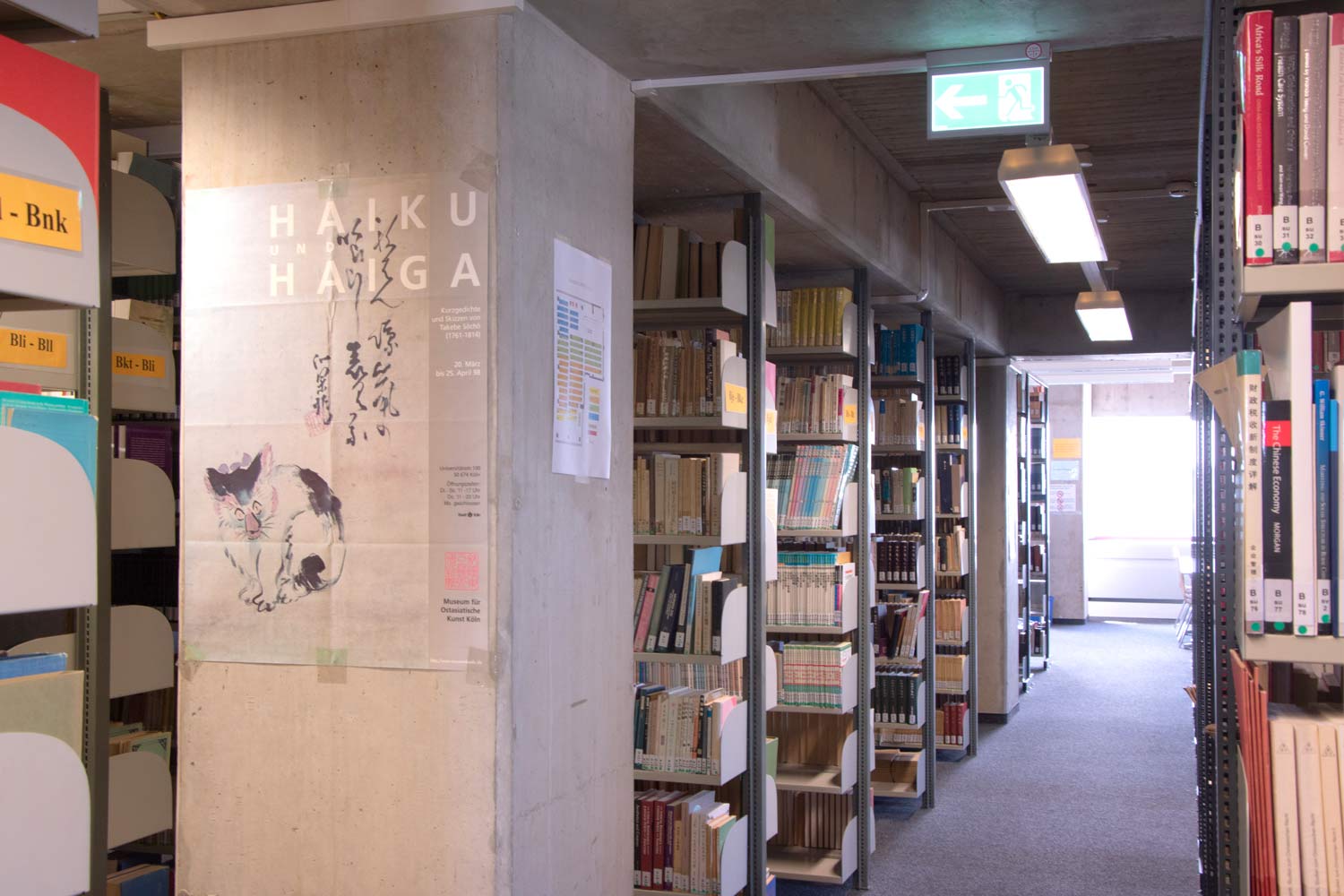Library of the Faculty of East Asian Studies
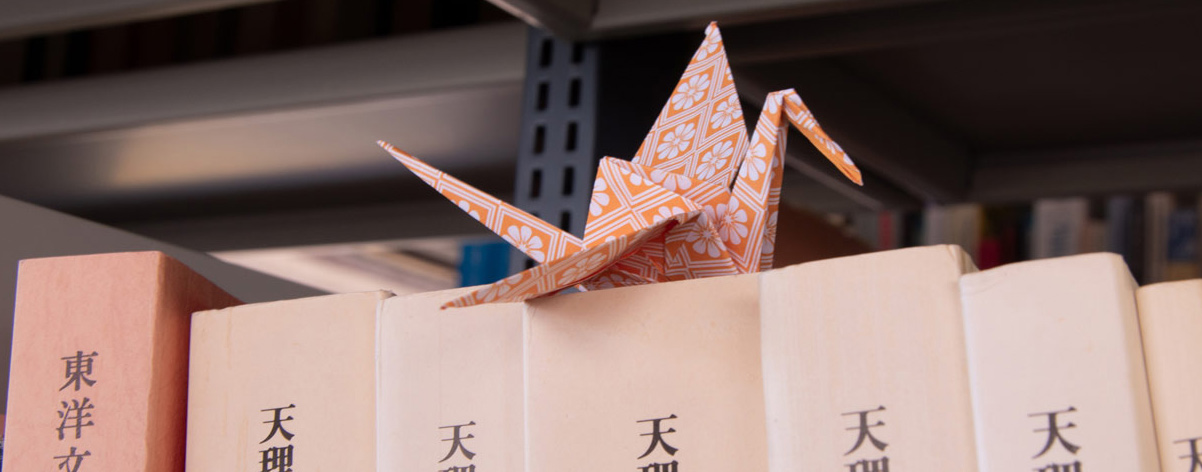
Opening hours
- Monday to Friday: 10 am to 4 pm
Loan hours
- Monday to Friday: 11 am to 1 pm
Location of the library
You find us in the University Library building, on the 4th floor in area 1.
How long can books be borrowed?
The loan period is two weeks. It can be extended twice, i.e. to a maximum of six weeks, before the books have to be returned to the library.
The extension can be requested via e-mail or in person at the supervisor's desk.
Please notice: If a book is urgently needed by a fellow student, a borrowed book must be returned as soon as possible.
How long can other media be borrowed?
Other media, such as CDs and DVDs, can be borrowed for one week.
How many books can be borrowed at the same time?
Students can borrow a maximum of ten books at a time. Special arrangements are possible if the books are needed for the final thesis.
New Service Hours at the OAW Library Starting 1 August 2025 /h4>
30 June 2025
The OAW Library at Ruhr University Bochum announces new opening and loan hours, effective from 1 August 2025. These hours apply during both the semester and the lecture-free period:
- Opening hours: Monday to Friday: 10 am to 4 pm
- Loan hours: Monday to Friday: 11 am to 1 pm
Book loans are only possible during the designated loan window and are subject to the library’s existing loan regulations. For any inquiries, the library staff is available in rooms 17–20 on level 5 of the University Library.
Second Intern in Library Science from Tsukuba
10 October 2024
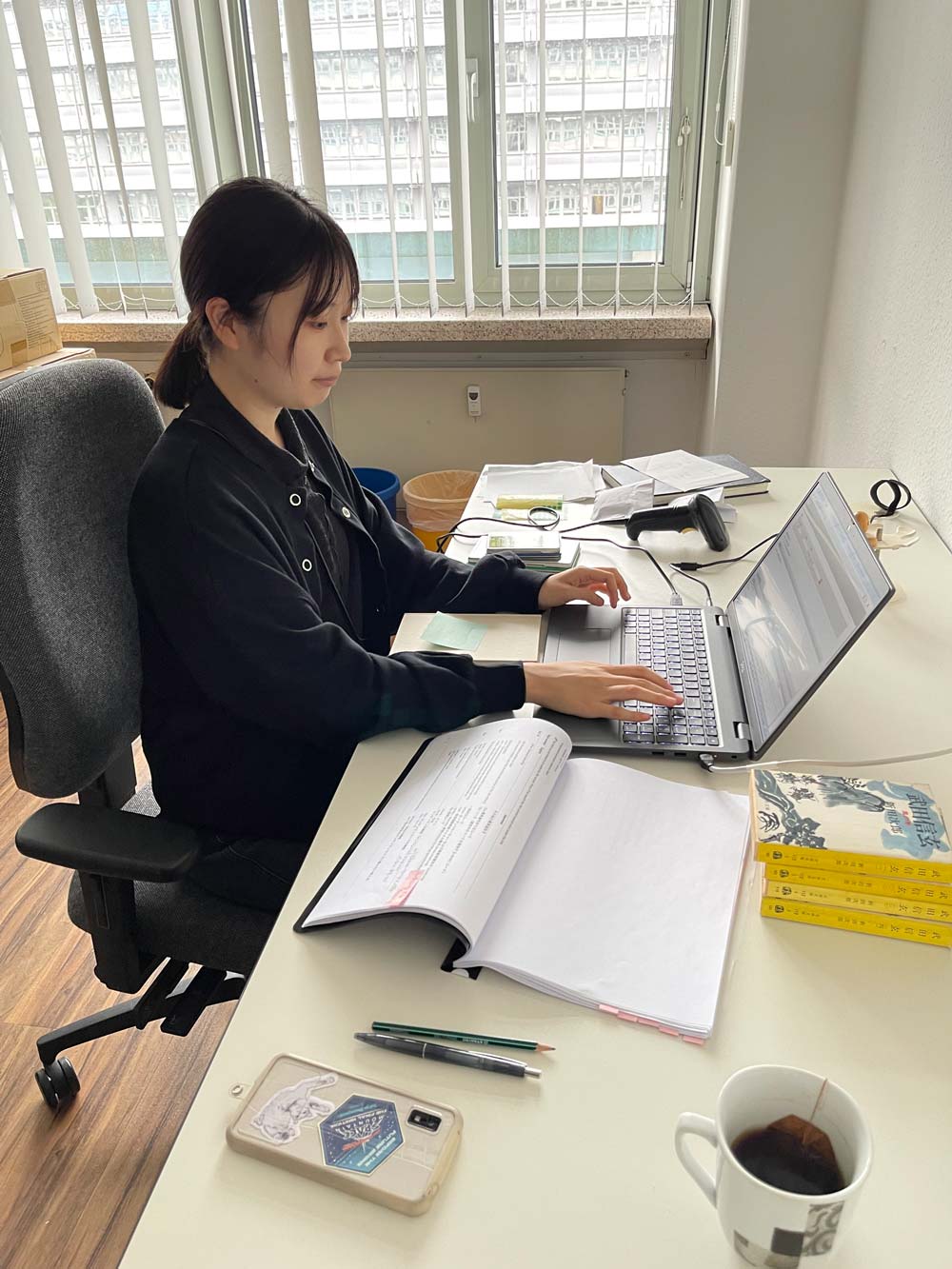
From 17th until 26th September 2024, we had the honor of welcoming Ms. Hiyori Matai from the University of Tsukuba. As the second intern in the framework of our cooperation with Tsukuba, Ms. Matai completed her internship at the Library for East Asian Studies. Under the expert guidance of Ms. Sauer, our specialist in the field of Japan, she was able to gain valuable insights.
Ms. Matai, who studies Library and Information Science at the University of Tsukuba, has a particular interest in the digitization of libraries and archives. During her stay at our OAW Library, she familiarized herself with the cataloging system and had the opportunity to visit the impressive Siebold Collection.
It was a great pleasure for us to host Ms. Matai in Bochum. We hope to welcome many more interns from Tsukuba to Ruhr University in the future.
RUB Primo Catalog
Are you looking for literature published before 1996? Simply search in the virtual card index of our digitized alphabetical main catalog (OAW-DAHK).
Use and stock
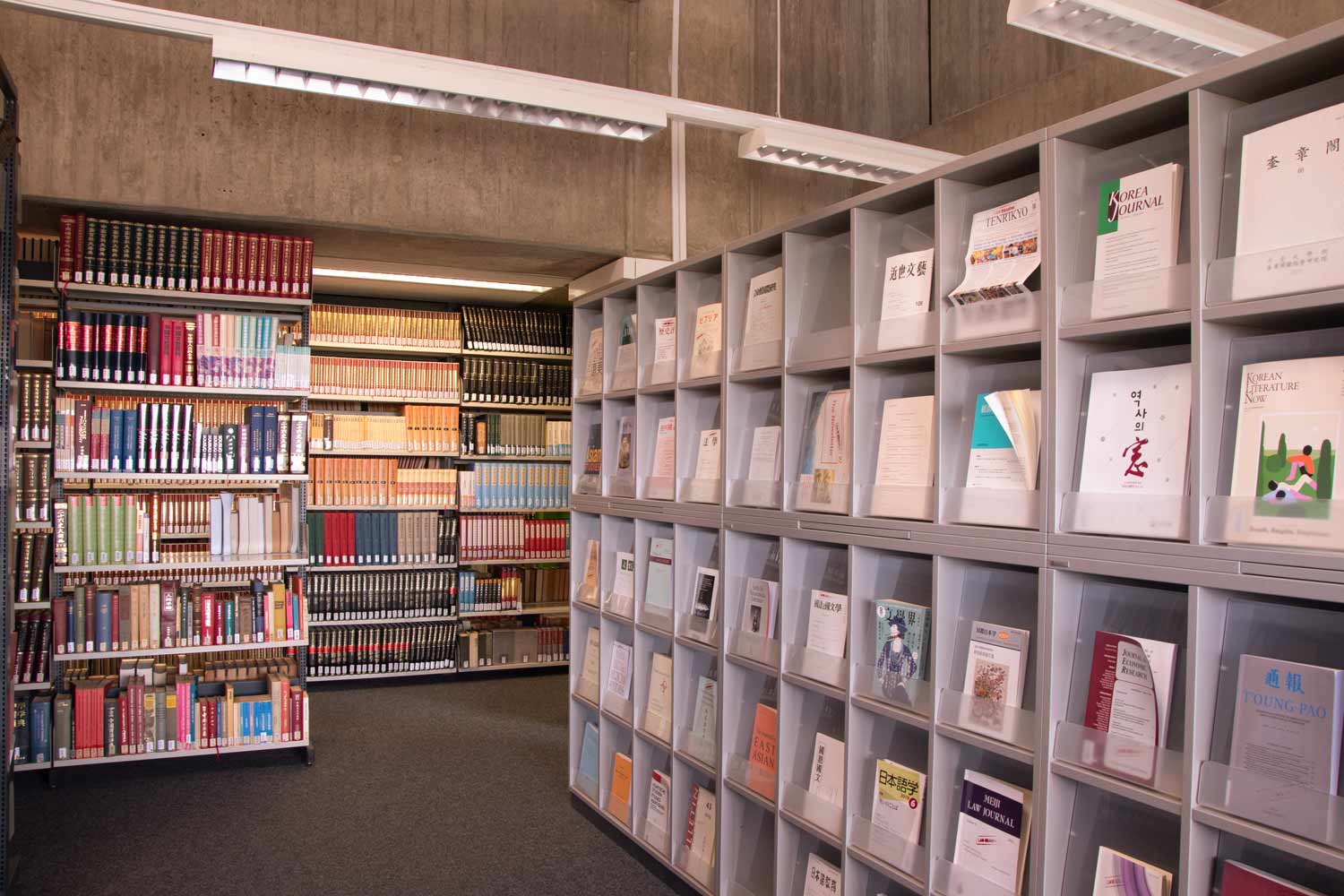
- Reference library (Please note: Interlibrary loans from the library's holdings are not possible!)
- 227.209 volumes, ca. 315 (e-)journals
- Library sigel: 294/15
- Moodle course for students and workers of the Faculty of East Asian Studies
The book holdings from 1997 onwards can be searched in the RUB PRIMO catalog of the University Library (see search slot above). Retro-cataloging is currently underway to make older holdings searchable via the catalog. Until this is completed, the digital card catalog must be used to search the holdings up to 1997.
Information about usage
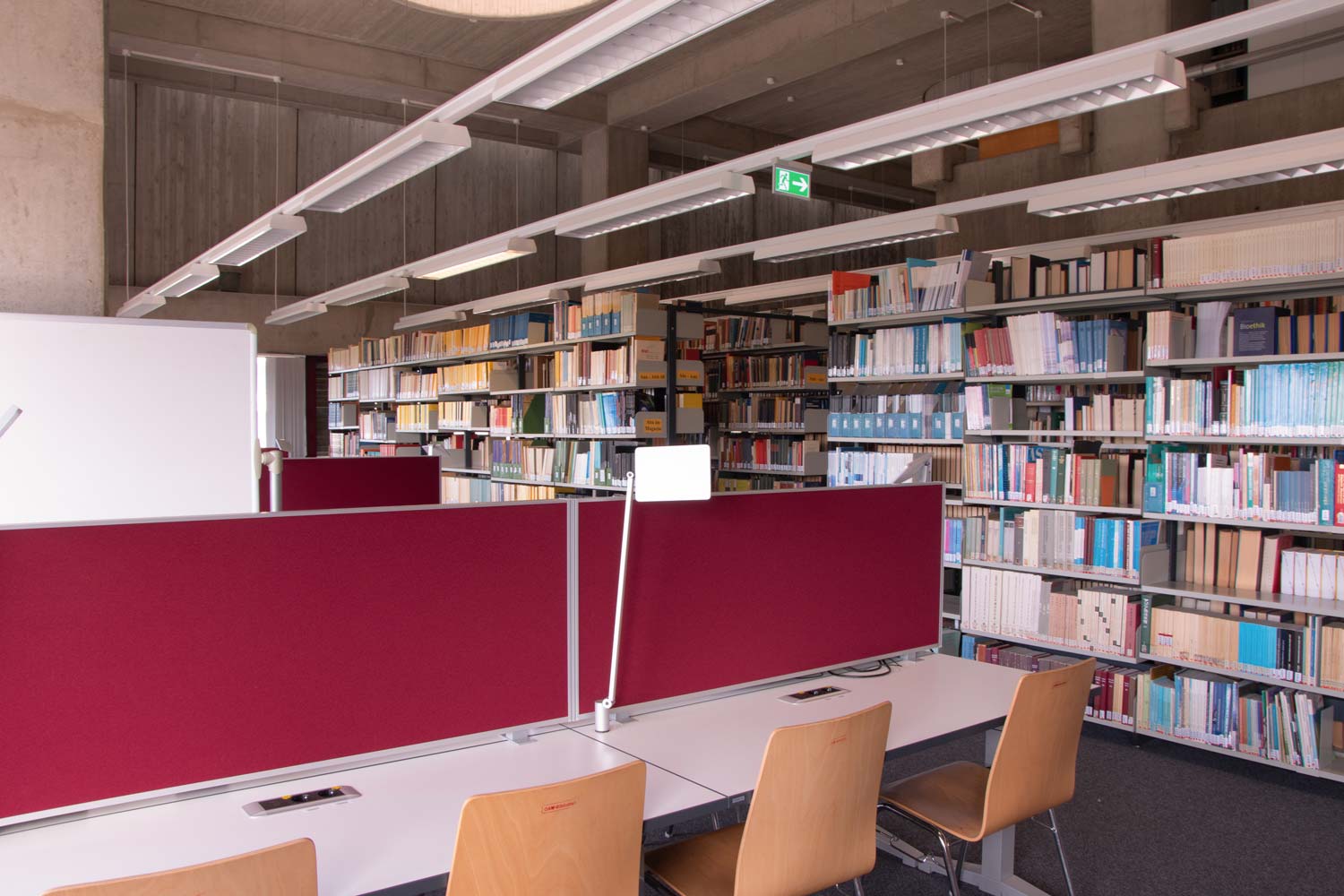
The library of the Faculty of East Asian Studies (OAW library for short) is a reference library that is open to all visitors during its opening hours. We have three research workstations, 48 workstations in the library and nine reading places in the stacks.
Lending options
Although the books in the OAW library are marked as reference collection in the OPAC, they can still be borrowed under the following conditions:
- Members of the faculty may borrow most books* from the collection for a period of 2 weeks from the OAW library supervisor, provided they have a user card. User cards can be applied for by presenting a current certificate of enrollment and an ID card.
- Students from other faculties who attend a course at the OAW faculty can apply for a semester card. In addition to presenting a current certificate of enrollment and an ID card, the lecturer must confirm attendance at the course on the application form.
- Visitors from outside the faculty can borrow books for copying during opening hours by depositing a deposit (ID card, driver's license, etc.). Night and weekend lending is also available.
*Journals, encyclopedias and dictionaries are excluded from lending and can only be borrowed for copying. Books from a reference collection can also only be borrowed for copying or overnight.
Loan hours:
Monday to Friday: 11 am to 1pm
Overnight lending:
from 12 pm to 12 pm the following day
Weekend lending:
from Friday 12 pm to Monday 12 pm
Please note: Loans and returns end 15 minutes before the information desk closes. Please take this into account when you visit the OAW library.
Special regulations
Important: Despite its location, the OAW library is not part of the university library. Books may therefore only leave the hall after consultation with the supervisor and must also be returned to the supervisor of the OAW library! It is not possible to borrow or return books at the information desk of the University Library.
Furthermore, the blue baskets may not be taken into the OAW library, but must be deposited on a shelf in the entrance area during use. The same applies to drinks – including water!
The library should be a place where you can concentrate on your work. Please do not engage in loud conversations and switch your cell phone to silent mode.
The East Asian Studies Department has a library with a collection of around 225,800 monographs and over 300 current journals and daily newspapers in European and Asian languages (Chinese, Japanese and Korean). In 1997, computerized title acquisition was started (RUB Primo catalog). The entire collection up to 1996 is listed in the digitized alphabetical main catalog (OAW-DAHK).
The section collections
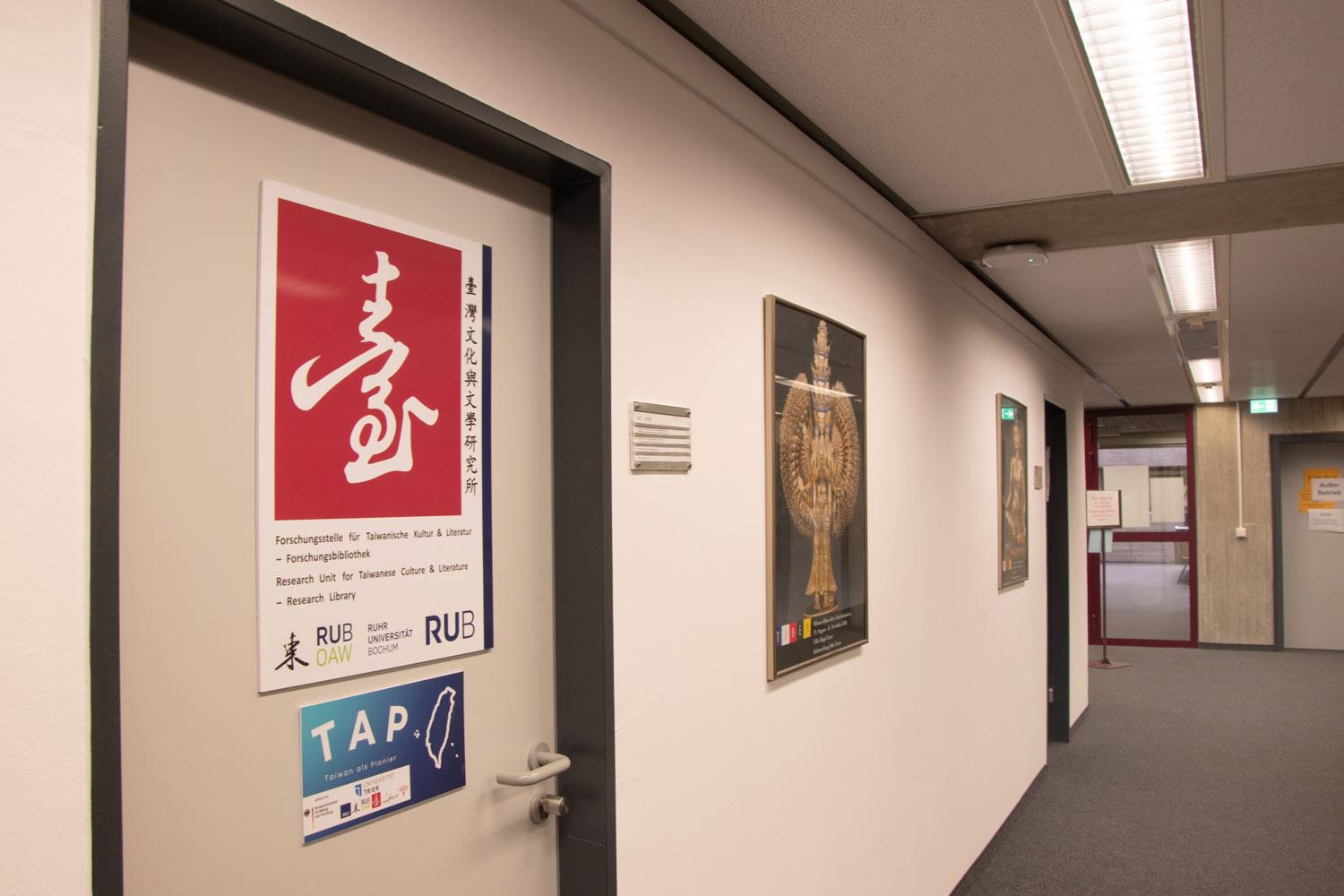
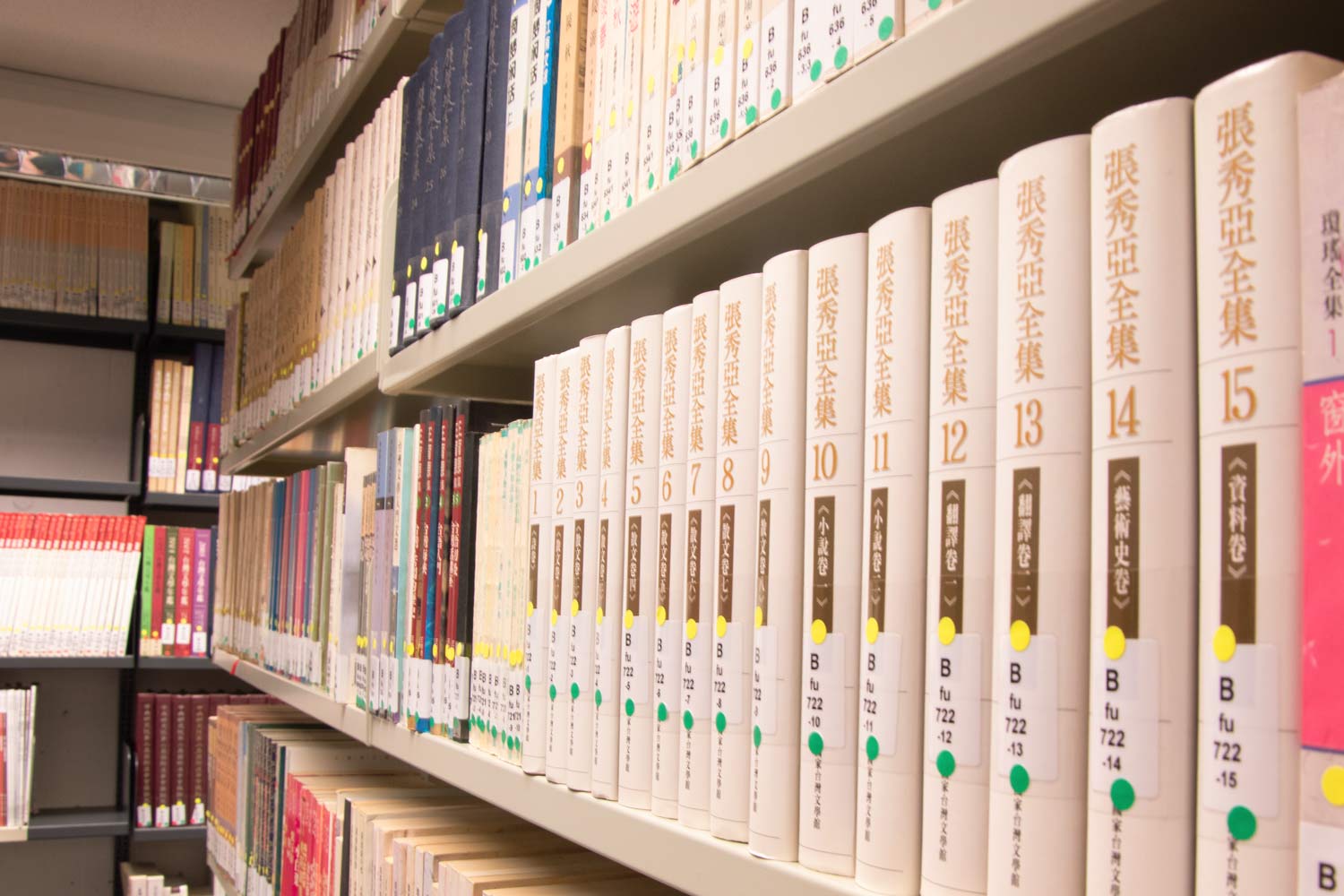
Individual sections maintain up-to-date, specialist and research-related collections, which supplement the range with new and recent titles in particular. For example, the Language and Literature of China section is home to the Taiwan Research Unit, founded by Prof. Helmut Martin, which focuses on the culture and society of Taiwan. The collection, which is recorded electronically and is therefore fully accessible online and constantly being added to, comprises well over 6,000 volumes. In its concentrated form, this unique collection represents the largest research library on Taiwanese culture and literature outside Taiwan. Workshops, research visits and generous gifts and donations from the Cultural Department of the Taiwanese Embassy in Germany and Ms. Tienchi Martin-Liao underline both the importance of and interest in this collection.
Attached to the library is the Siebold Archive, which consists of over 1,100 manuscripts and printed works and represents a valuable corpus for historical research on Japan in the 19th and early 20th centuries.
In the Richard Wilhelm Translation Center, which deals with Chinese-German translation literature in the cultural field from the beginning of the 18th century to the present day, over 1,500 titles are bibliographically recorded and accessible to specialists and interested parties.
In connection with the appointment of Prof. Regine Mathias and the establishment of a new focus on modern and recent Japanese history, the Ruhr University Bochum was chosen as the future location for a collection on Japanese social and economic history, which was donated by Prof. Hidemura from Japan. The collection includes works on agrarian constitution in the early modern period, on local and regional history, but also on modernization and industrialization in the modern period, on mining and the energy industry as well as on ethnological and religious issues. These holdings are made accessible to interested scholars and students of European Japanese studies through electronic indexing.
The signatures in the OAW library are structured according to the following system:
The first letter of a call number determines the regional focus of the book:
- A = General information
- B = China
- C = Japan
- D = Korea
The second letter determines the type or subject area of the book:
- a = Book and position verification
- b = Periodica
- c = Research
- d = Reference works
- e = Dictionary
- f = Source (original language)
- g = Commenth = source (in translation)
- j = language
- k = literature
- l = history
- m = Politics
- n = religion
- o = Philosophy
- p = art
- q = Geography
- r = people, sociology
- s = economy
- t = state, law
- u = Education
- v = Media
- w = science
- x = Militaria
- y = Material culture
- z = Reception of non-Asian culture in translation and representation in China, Japan or Korea
Further letters define the focus within the subject area. A detailed list of the focal points can be found in the OAW library classification system. The number indicates the consecutive number on the shelf.
Other possible additions:
- -X - X. Volume
- X - X. edition
- /X - X. Edition in stock (e.g. edition from another publisher or in translation)
- +X - X. Copy in stock
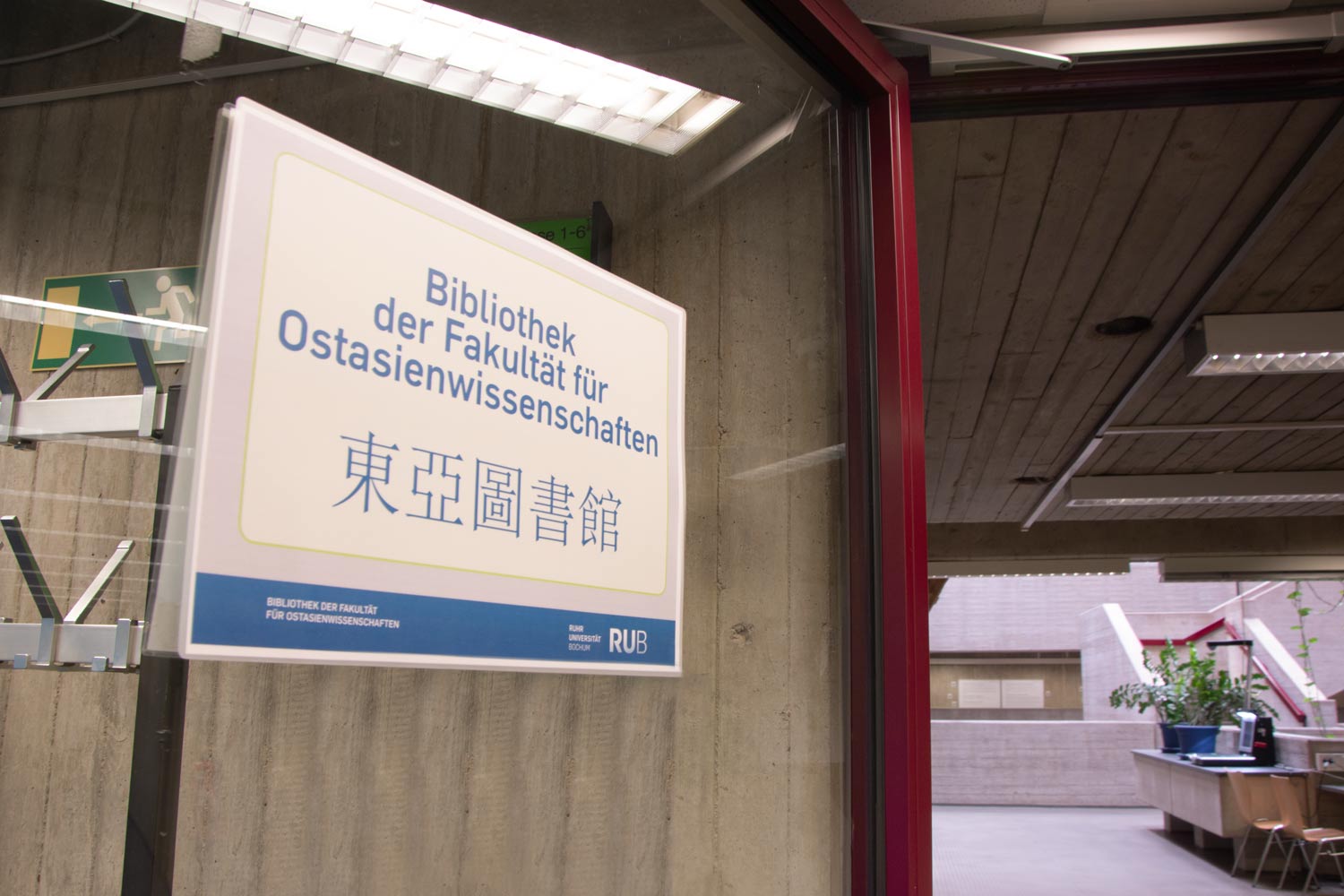
Most of the books in the OAW library collection are located on the fourth floor of the university library in area 1. There are two exceptions:
1) Journals and some old and large-format books are located in the OAW Library stacks on the fifth floor, the latter are identified by a deputy on the shelf. To gain access to the stacks, you must report to the supervisor.
2) For some titles, a different location is noted in the catalog.

Taiwan Library (RU) – The Taiwan Library is located in rooms 4/2-3 of the OAW Library. When you enter the OAW library, you will find it on the right-hand side next to the supervision desk.
The Taiwan Library has separate opening hours. The titles can be borrowed with the same restrictions as the other titles in the OAW library.
Richard-Wilhelm ÜZ – This Library is located in MB / floor 2 room 105.
The opening hours are generally Mondays from 9 am to 2 pm; Tuesdays from 10 am to 5 pm; Wednesdays from 10 am to 5 pm; Thursdays from 12 am to 4 pm; Fridays from 8 am to 12 am.
OAW-Archive – The archive of the OAW library is located on floor 5 in room UB 5/19. The books cannot be borrowed, but can only be viewed by prior arrangement with the Head of library Mr. Schütte (Tel.. 0234 32 28092, michael.schuette@rub.de, UB 5/20).
Siebold-Archive – The Siebold archive is located in the OAW magazine on the shelf opposite the steel door. These titles can only be borrowed for copying.
Data carriers with the supervisor – Language textbooks are usually marked with this location. The books themselves are in their designated place on the shelf, the corresponding data carriers are available on request from the supervisor and can be borrowed by faculty members for one week.
Multimedia cupboard– The multimedia cupboard is located on the fifth floor by the library administration offices. The titles can be borrowed for one week on request from the library staff.
OAW-Magazine – Titles with this location are located in the stacks on the fifth floor. The titles can be borrowed with the same restrictions as the other titles in the OAW library.
At this point we would like to introduce you to some sites that can help you with literature research and procurement.
Overview
In General
- The East Asia Department of the Berlin State Library offers together with the Blauen Leihverkehr an interlibrary loan service for literature in East Asian languages, which can be used by members of the Faculty of East Asian Studies.
- The virtual specialist library CrossAsia.org provides access to numerous databases relating to East Asia. Members of the faculty can access the extensive databases after registering free of charge.
Please notice: As part of the registration process, confirmation of your faculty affiliation is required. You can obtain the necessary stamp by presenting a certificate of enrollment to the library supervisor. - The Karlsruhe Virtual Catalog (KVK) offers the possibility to simultaneously access a large number of German and international library catalogs and to do research in the book stores (including WorldCat).
- On the Website of the German Society for Natural History and Ethnology of East Asia you can download some older magazines and books published by the society.
- You can access many magazines via platforms like JSTOR, Project MUSE or the electronic journal library from home or from the university network.
China
- A recommended Chinese library catalog is the catalog of the Library of Shanghai.
- On the websites of the Classical Historiography for Chinese History (compiled by Benjamin Elman) contains links to numerous resources and extensive bibliographies on a wide range of topics.
- The Chinese Philosophical Etext Archive of the Weslyan University provides access to numerous philosophical texts in full text and offers further information.
- You can find more links in the collected online resources of the sections language and literature of China and History of China.
Japan
- A recommended Japanese library catalog is CiNii. CiNii offers the possibility to search for monographs as well as articles, some of which are also available in full text in digital form. CiNii not only searches its own database, but also accesses the database of the National Parliamentary Library (NDL-OPAC) among others.
- The National Diet Library Digital Collections are freely accessible, digital collections of the National Library of Parliament, comprising a total of around 800,000 books, journals, dissertations, online publications, rare prints and historical materials.
- IRDB (Institutional Repositories DataBase) is an extensive digital collection of scientific articles, dissertations and research reports.
- Further links can be found in the section's collected online resources of the History of Japan.
Japanese journals with online access
Some Japanese journals in our collection can also be searched online. Some can only be accessed from the university network – these are marked with an asterisk.
Especially for Japan-related journals, the platform J-STAGE is a good point of contact.
- Nihongo no kenkyū 日本語の研究 = Studies in the Japanese language
- Monumenta Nipponica*
- Nihongo kyôiku / 日本語教育 = Journal of Japanese language teaching
- Japanese research in business history
- Chirigakuhyôron / 地理学評論
- Journal of Japanese Studies*
- Japan Labor Bulletin (from 1992)
- Japan Labor Review
- SGI quarterly: a Buddhist forum for peace, culture and education*
- Japan Forum*
- JDZB Echo (from 74/2006)
- JDZB-Echo : Berurin Nichi Doku Sentâ kôhôshi / ベルリン日独センター広報紙 (from 74.2006)
- Social science Japan: newsletter of the Information Center for Japanese Social Studies, Institute of Social Science, University of Tokyo
- Sekai no Nihongo kyôiku / 世界の日本語教育 = Current report on Japanese language education around the globe Unterreihe: Nihongo kyôiku ronshû / 日本語教育論集
- Jinbun chiri / 人文地理 = The human geography
- Hokkaidō-Daigaku-Daigakuin-Bungaku-kenkyūka-kenkyū-ronshū = Research Journal of Graduate Students of Letters (Nr. 10-18)
- OECD economic surveys Unterreihe: Japan
- DIJ Newsletter (ab 2001)
- Zenjin / 全人 = The whole man education
- Japan Journal
- German Society for Natural History and Ethnology of East Asia: OAG-Notizen
- Journal of the Graduate School of Letters
- Urawa/浦和: Nihongo kyôiku kiyô / 日本語教育紀要
- Nami / 波 : monthly magazine (from 2012/5)
- Shosai no mado / 書斎の窓
- Japan and the world economy : international Journal of Theory and Policy*
- Ritsumeikan Daigaku Jinbun Kagaku Kenkyûsho kiyô/ 立命館大学人文科学研究所紀要 = Memoirs of the Research Institute of the cultural sciences (from 2002.9)
- Ryûgakusei Nihongo Kyôiku / 留学生日本語教育
- Jinbun kagaku kenkyû / 人文科学研究 = Studies in humanities (in parts)
- Analecta Nipponica : journal of Polish Association for Japanese Studies
- Nara Bunkazai Kenkyûjo kiyô/ 奈良文化財研究所紀要
- Kenkyū Kiyō / Studies in Humanities and Sciences (parts are online)
- Kokusai seiji = International relations
This list does not claim to be exhaustive. If you discover links that no longer work or know of other journals in our collection that can be accessed online, please let us know via E-mail.
Korea
- RISS is the largest academic bibliographic institution in Korea. The database includes a union catalog of more than 550 academic libraries. It also maintains an extensive digital collection of articles and dissertations relating to Korea, some of which can be viewed in full text. CrossAsia (see above) provides access to the licensed database RISS International.
- The digital library of the National Library of Korea offers free access to numerous monographs from the period before 1945. CrossAsia (see above) provides access to further licensed content, such as articles, dissertations and more recent monographs.
- KORCIS (Korean Old and Rare Collection Information System) is a digital collection that focuses on old and rare books and manuscripts and provides access to over 36,000 full texts.
- The National Assembly Library of Korea offers access to a large digital collection, similar to the National Library, but focuses on theses and essays.
- You can find more links of the annotated online tools in the Section Language and Culture of Korea.
Faculty resources
- In the RUB Primo Catalog you can search for all books that have been acquired and recorded since 1997. The Digitized alphabetical main catalog (OAW-DAHK) provides you with a virtual card index in which you can search for items that have not yet been recorded.
- An overview of the journals available in the OAW library can be found in the East Asian Studies' current collection of journals. You can also research about magazines via the Magazine database (ZDB). You can recognize the OAW library by the siglum “NRW <294/15> Bochum Fak. Ostasienwiss”.
- The Estate Archive of Prof. Dr. Martin Ramming is an annotated overview of the estate, which can be viewed in the archive of the OAW library (UB 5/19).
- The Siebold-Archive comprises large parts of the estate of the German Japan researcher Philipp Franz von Siebold (1796-1866) and his son Alexander (1846-1911).
- Publications of the East Asia Institute of the Ruhr-University Bochum
- Bochum Yearbook for East Asian Research
This overview does not claim to be exhaustive and is primarily intended as an introduction to research. Should you nevertheless miss an important resource on this page and the linked pages of the sections, we would be very pleased if you could let us know this via e-mail, so that we can add it here.
Downloads
- Terms of use
- User card application
- Semester card application (for non-faculty students who are taking a course at the Faculty of East Asian Studies)
- Classification System of the Library of the Faculty of East Asian Studies
General
Research
- Catalogs of the University Library
- RUB Primo Catalog
- Digitized alphabetical main catalog (OAW-DAHK/ZKM)
- Current journal holdings of the Library of the Faculty of East Asian Studies (OAW-ZDB)
- Estate archive
- Congshu list
- Subject information East Asian Studies
